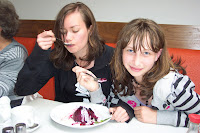 This information is supplied by Peta (People for the Ethical Treatment of Animals).
This information is supplied by Peta (People for the Ethical Treatment of Animals).How Does Eating Meat Harm the Planet?
Eating meat leaves behind an environmental toll that generations to come will be forced to pay.
Eating meat leaves behind an environmental toll that generations to come will be forced to pay.
Resources
While 40 million tonnes of food would eliminate the most extreme cases of world hunger, 540 million tonnes are fed to animals in Western countries every year. The world's cattle alone consume the same amount of calories as it takes to nourish 8.7 billion people - more than the entire human population on Earth.
Water
It takes 2,500 gallons of water to produce a pound of meat, but only 25 gallons to produce a pound of wheat. A totally vegetarian diet requires 300 gallons of water per day, whilst a meat-eating diet requires more than 4,000 gallons of water per day.
Land
Of all agricultural land in the UK, 90 per cent is used to raise animals for food, and we still need more food, so we import it from developing countries which often cannot even feed themselves. Using precious land to raise animals for food is wasteful. On 10 hectares, you can produce meat to feed just two people, maize to feed 10 people, grain to feed 24 people or soya to feed 61 people. Overgrazing of livestock has led to desertification around the globe.
Pollution
Raising animals for food causes water pollution as slurry leaches into the waterways. In some parts of Europe, slurry is the single greatest cause of acid rain. The methane produced by the world's cows is a major contributor to global warming.
Deforestation
Since 1950, half of all the world's rain forests have been destroyed to make way for grazing animals. After just six or seven years, the soil is so damaged that it can no longer support grass. It turns to dust. Tribal people are forced to move on as their habitat is sold off to the meat industry. In the UK, hedgerows are being cut down for the same reason, and 98 per cent of the forests that once covered most of the British Isles have been cut down.
While 40 million tonnes of food would eliminate the most extreme cases of world hunger, 540 million tonnes are fed to animals in Western countries every year. The world's cattle alone consume the same amount of calories as it takes to nourish 8.7 billion people - more than the entire human population on Earth.
Water
It takes 2,500 gallons of water to produce a pound of meat, but only 25 gallons to produce a pound of wheat. A totally vegetarian diet requires 300 gallons of water per day, whilst a meat-eating diet requires more than 4,000 gallons of water per day.
Land
Of all agricultural land in the UK, 90 per cent is used to raise animals for food, and we still need more food, so we import it from developing countries which often cannot even feed themselves. Using precious land to raise animals for food is wasteful. On 10 hectares, you can produce meat to feed just two people, maize to feed 10 people, grain to feed 24 people or soya to feed 61 people. Overgrazing of livestock has led to desertification around the globe.
Pollution
Raising animals for food causes water pollution as slurry leaches into the waterways. In some parts of Europe, slurry is the single greatest cause of acid rain. The methane produced by the world's cows is a major contributor to global warming.
Deforestation
Since 1950, half of all the world's rain forests have been destroyed to make way for grazing animals. After just six or seven years, the soil is so damaged that it can no longer support grass. It turns to dust. Tribal people are forced to move on as their habitat is sold off to the meat industry. In the UK, hedgerows are being cut down for the same reason, and 98 per cent of the forests that once covered most of the British Isles have been cut down.
You can find out more from http://www.peta.org/pdfs/leafletback.pdf








